
Introduction
Diarrhea is a condition in which you frequently get loose and watery bowel movements. It is a very common condition found in both adults and children. The common symptoms of diarrhea include dehydration, weight loss, abdominal cramps, nausea, etc. Whereas, individuals with severe diarrhea exhibit the symptoms of fever, blood, mucus in stools, darker urine, etc.
Most of the time diarrhea is short-lived and lasts for no more than a few days. It is mostly not a significant problem for adults (unless persists for more than 5 days). However, it is quite a serious problem for children as they can undergo dehydration within a matter of hours. This is why children having diarrhea require immediate medical attention.
This blog entails various remedies to treat diarrhea naturally. It will also enlighten you about the foods you should consume to cure diarrhea at home along with the discussion on the foods to avoid to ease your stomach. Nevertheless, it is advised not to rely entirely on home remedies to treat any condition and seek medical attention if the condition does not seem to improve in a day or two. Depending completely on remedies is also not recommended for infants and young children.

Also Read: Symptoms of Diarrhea: Causes, Treatment, and Preventions
Diarrhea Remedies
Diarrhea can be quite uncomfortable. The frequent urge to use the toilet during diarrhea may restrict your everyday chores and might restrict you at home as well. Considering the short span of diarrhea, it can be treated using various natural remedies. Following are the top five most effective natural remedies for diarrhea;
Ways to stay hydrated during diarrhea
Since diarrhea is the condition in which an individual gets frequent, watery, and loose bowel movements, the body tends to lose a significant amount of water with each trip to the toilet. This may lead to dehydration. Since every cell of the body requires water for its optimal functionality, losing too much water can be seriously dangerous for the body.
The signs to look out for dehydration in adults include decreased urination with darker urine, fatigue, weakness, elevated thirst, dry mouth, etc. If a child is having a fever of 102° F or above, a dry mouth, decreased energy levels, decreased urination, and tearless crying along with diarrhea, it is a strong indication of dehydration.
To naturally overcome the dehydration, you can use the following remedies;
Use of clear liquids
To combat dehydration, you should increase the use of both water and fruit juices. Make a goal to intake at least 8 to 12 cups of clear liquids a day. Since nausea is another symptom of diarrhea, you should sip the liquids slowly in between meals rather than gulping a gallon at once.
Consume ORS
ORS, Orally Rehydrated Solution, is a solution specially designed to combat dehydration. It is packed with salts which can help you overcome the electrolyte imbalance. Orally rehydrated solutions are available over-the-counter, although you can easily make your own as well. Dissolve six teaspoons of sugar and half a teaspoon of salt in five cups of water and consume it throughout the day.

Maintain electrolytes and salts using sports drinks
Some doctors recommend the use of sports drink to overcome the deficiency of salt, potassium, and other electrolytes that occurs during diarrhea. However, carbonated drinks should be avoided as they can aid in the formation of gasses which can increase the discomfort during diarrhea.
Not all fruit juices help
You should be picky about the fruits you consume while having diarrhea. The juices from fruits like apples and peaches can do more harm than good as they are rich in fiber and can cause a further strain on the digestive system.
Foods to eat in diarrhea
Considering the unease that comes with the frequent visits to the bathroom, you might think about skipping your meals altogether. However, skipping meals can increase your weakness which is why you need to have your meals on time. Following are the foods and diets which can be beneficial in treating your diarrhea;
The BRAT diet
This diet consists of Bananas, Rice, Applesauce, and Toast. This diet has been the top choice of pediatrics for children who have multiple food intolerances. The BRAT diet can be a safe choice for anyone dealing with diarrhea, nausea, or vomiting.

High potassium food sources
Frequent bowel movements result in the loss of potassium. To overcome this deficiency, you should consume foods rich in potassium. The top options include lentils, pineapples, coconut milk, mangoes, citrus fruits, etc.
Other bland food options
If you or your child is experiencing diarrhea, avoiding spicy foods and opting for a non-spicy and bland diet for a few days can be beneficial. You may choose boiled potatoes, oatmeal, rice porridge, unseasoned crackers, etc.
Effective ways of consumption
To make the most of what you are consuming, you can try breaking down your meals into multiple smaller portions. This will decrease the load on your digestive system and thus will ease your diarrhea.
Foods to avoid in diarrhea
You need to be extra careful about what you eat to ensure quick treatment of your diarrhea. Simply avoid eating the foods which can aggravate your digestive system making your diarrhea worse.
Major foods to avoid in diarrhea include;
Spicy meals
Spicy food items can irritate various parts of your digestive tract and can make your diarrhea worse. Capsaicin found in many spices has the potential to damage the lining of your digestive tract which can induce a laxative effect in some people and thus can worsen your symptoms of diarrhea.
Fried foods
Foods rich in fats and oils can increase the sensitivity of the digestive system.
Artificial sweeteners
Artificial sweeteners contain sorbitol, erythritol, and mannitol which are non-absorbable sugars. These can produce a laxative effect and can induce more diarrhea.
Foods rich in fibers
Foods rich in fiber are generally considered to be beneficial for the gut, but if you have diarrhea, it is good to avoid them. They can increase the strain on the digestive system and can worsen your diarrhea. Foods rich in fiber to avoid include whole grains, grain cereals, nuts, barley, etc.
Sugary foods
Too much sugar in your food can interact with the bacteria of the gut. During diarrhea, these bacteria are already sensitive, and added sugar can further cause harm. It is best to avoid high-sugar fruit juices, candies, cakes, chocolates, etc.
Other foods to avoid
Other food items which should be avoided during diarrhea include beans, fatty meats, Brussel sprouts, broccoli, cabbage, pork, raw vegetables, veal, and all types of processed or packaged foods.
All about Probiotics
Not all bacteria are harmful to humans. Probiotics refer to the beneficial bacteria that live inside your digestive tract, aid in digestion, and keep your gut happy and healthy. Probiotics are not labeled as medicines, rather are referred to as food items.
Types of probiotics
There are various types of probiotics including Lactobacillus, Saccharomyces boulardii, and Bifidobacterium.
Lactobacillus is a major probiotic. It is abundantly present in various fermented food items. Lactobacillus can help your diarrhea as it aids in the digestion of lactose by producing lactase enzymes for your gut. Saccharomyces boulardii is a yeast present in probiotics. It also helps in digestion. Bifidobacterium is the probiotic found in dairy products. It is mainly used by patients with Irritable Bowel Syndrome.
How do probiotics work?
Probiotics help in the treatment of diarrhea by re-establishing a healthy biome inside your gut. These bacteria and yeast provide digestive enzymes which assist the digestive system of the body.
Significance of probiotics
Probiotics can be used to treat diarrhea in kids, diarrhea from antibiotics, and diarrhea caused by C. difficile. Probiotics can also be beneficial to treat ulcerative colitis and Crohn’s disease, forms of inflammatory bowel disease (IBD).
Common sources of probiotics
The readily available sources of probiotics include pickles, miso, sourdough bread, kefir, sauerkraut, tempeh, kimchi, kombucha, and yogurt.

Over-the-counter drugs
Another remedy to treat diarrhea at home is to consume over-the-counter drugs. Though self-medication is not a wise decision, however, for treating small conditions like diarrhea, you can trust your instincts.
While using over-the-counter drugs, it is important to note the duration of the treatment. If as an adult, your condition is not getting any better after self-medicating for three days, you should consult a doctor. In contrast, it is not advised to use over-the-counter drugs on children, let alone infants, without informing their doctors. Also, always comply with the instruction given along these medications to safeguard yourself from overdose and other hazards.
Common over-the-counter drugs for diarrhea
The two commonly available over-the-counter drugs for diarrhea include;
Bismuth subsalicylate
The antacid elixir drug bismuth subsalicylate, often known as pink bismuth and marketed under the brand names Pepto-Bismol and BisBacter, is used to treat short-term stomach and gastrointestinal tract discomforts like nausea, diarrhea, heartburn, indigestion, and upset stomach.
Loperamide
Loperamide is a drug intended to lessen the frequency of diarrhea and is marketed under the trade names Imodium and others. It is not advised for people who have fevers, mucus in their stools, or blood in their stools.
When to call the doctor?
Diarrhea can cause a variety of severe symptoms in both children and adults. You should not rely on home remedies and consult the doctor immediately if your diarrhea persists for more than 2 days without any betterment, if you notice signs of dehydration with fever and stomach pain, and if you notice blood in your stool.
Diarrhea in children has similar symptoms but requires immediate care as it can lead to dehydration within a matter of hours. Consult a doctor if the condition of your child does not improve within a day.
Conclusion
Diarrhea is a common occurrence that can be treated using various remedies. Keeping your food consumption in check, utilizing over-the-counter drugs, including probiotics in your diet and staying hydrated are some ways you can ease your diarrhea.





